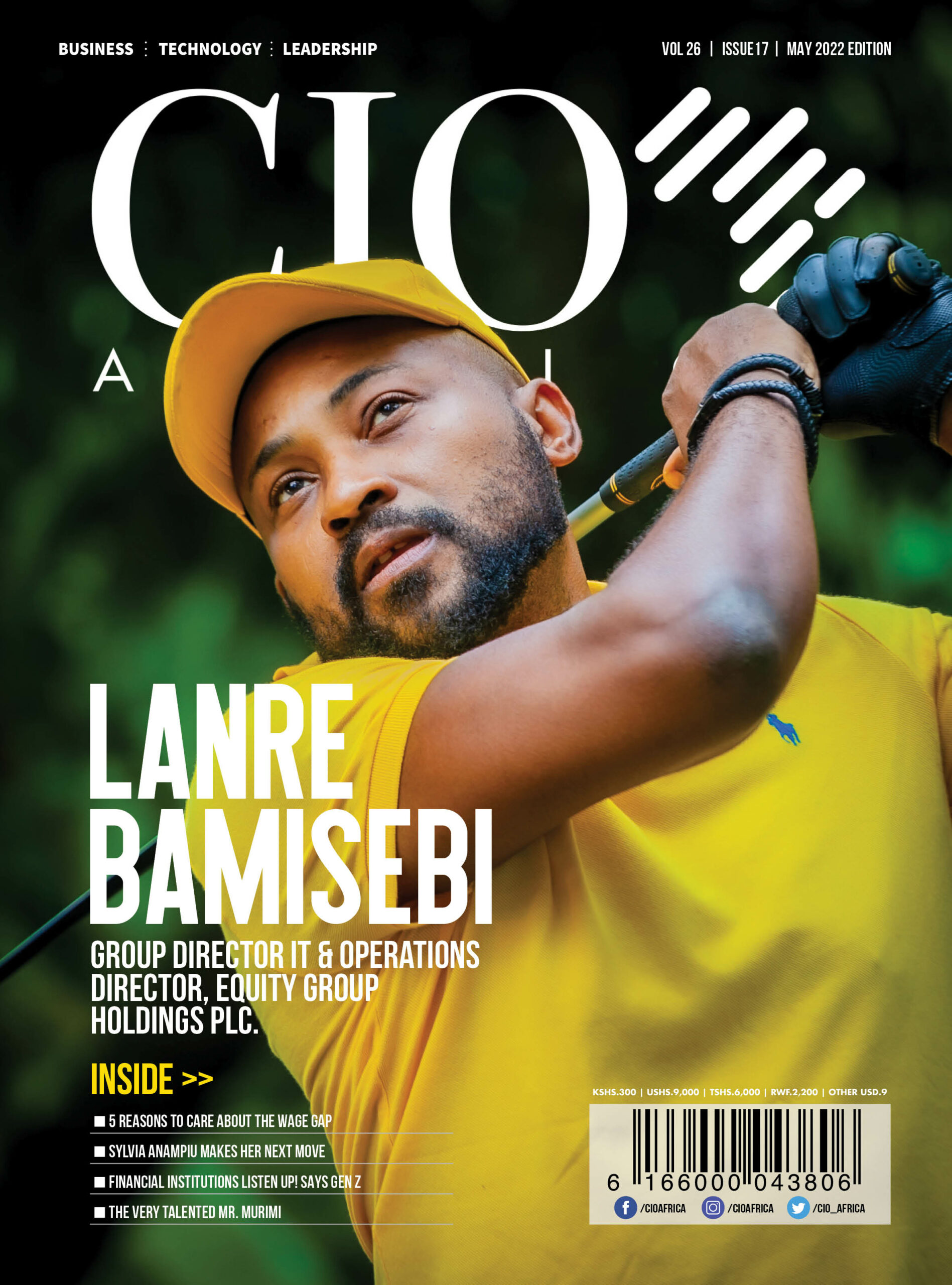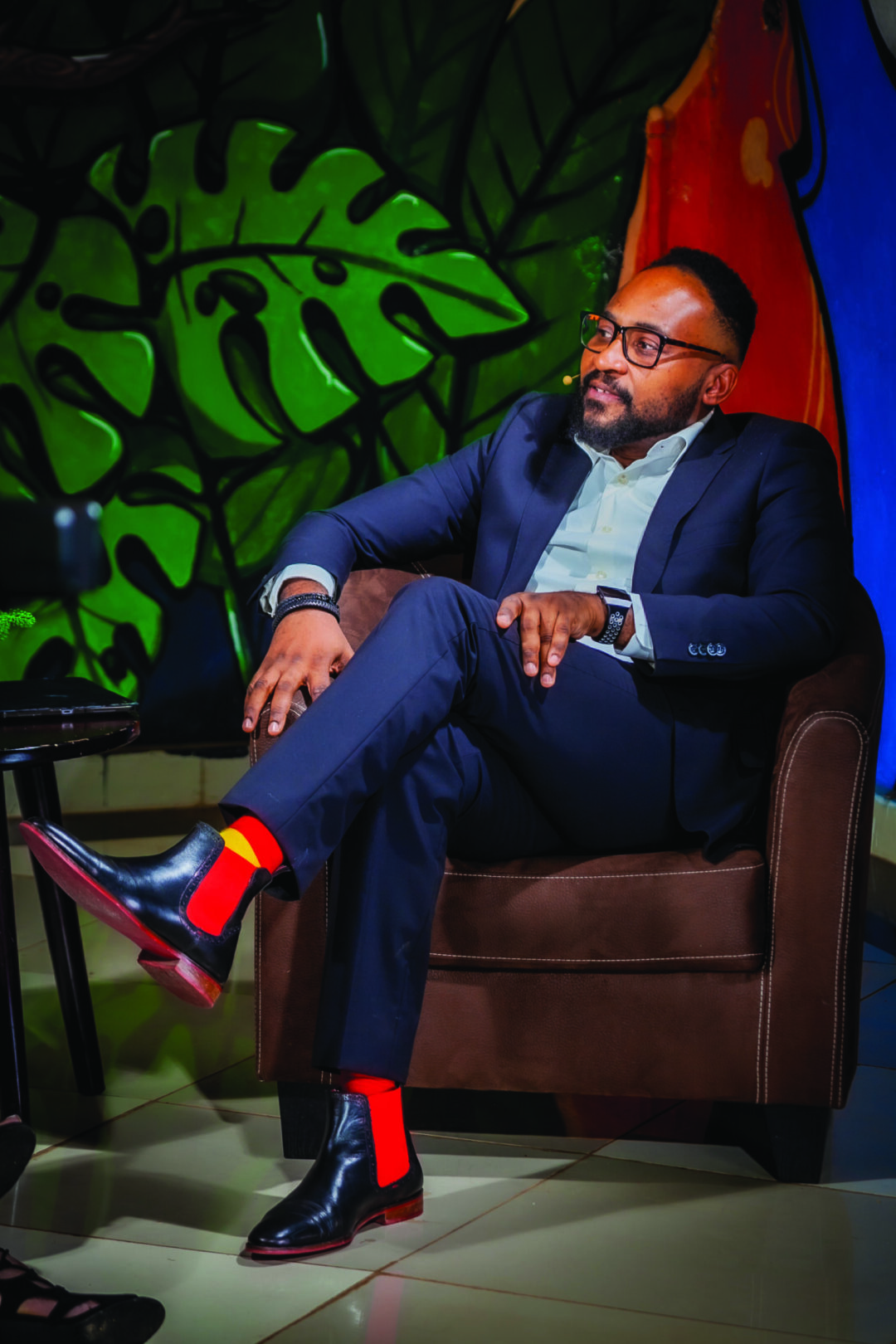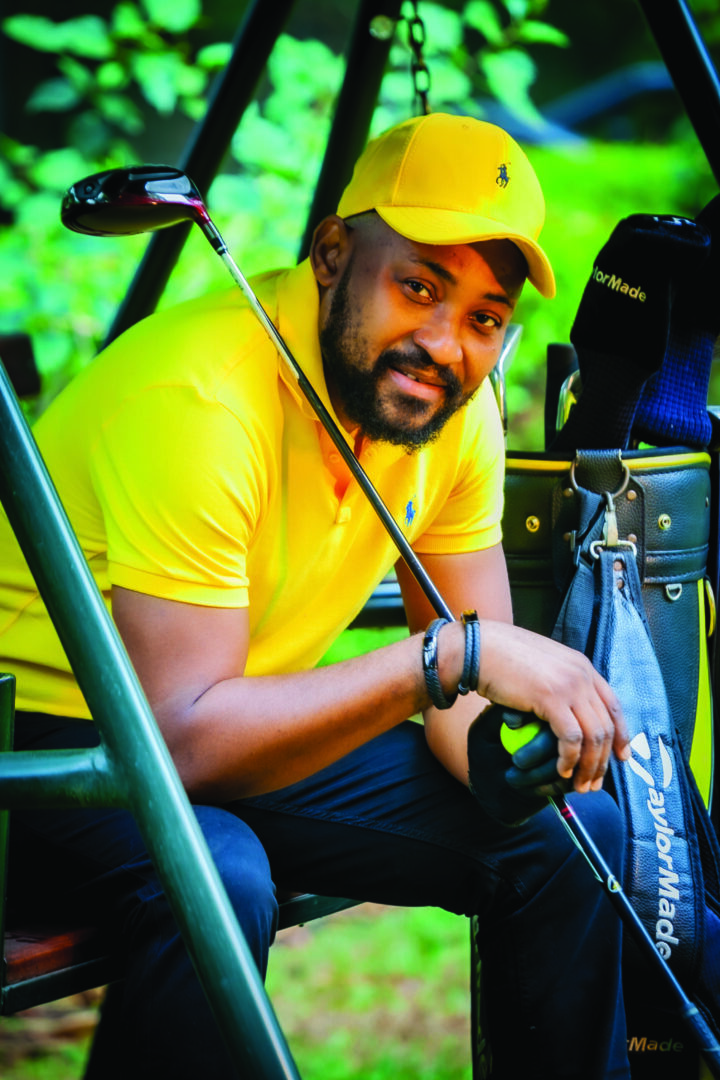advertisement
A Tour Of Lanre Bamisebi’s Mind

Legend has it that once upon a time, during a CIO Africa (then East Africa) event, Dr James Mwangi, CEO and Group Managing Director, Equity Bank, following the illumination on the role of a Chief Information Officer (CIO), paused for a moment and declared he would like to be a CIO. He got it, long before most did, the significance of the CIO. Said bank now has a league of CIOs, up from the lonesome one pre-COVID-19.
Perhaps this is why it has taken months of calendar scheduling to pin down Lanre Bamisebi, (then, Group Director IT & Operations Director, Equity Group Holdings Plc. – now
In fact, I get to boast how I got Lanre to set aside his phone for almost an hour, a fete I begin to appreciate as near impossible during the interview. Aside from an all-hands-on-deck career, he is pursuing a PhD at USIU-Africa. He has a Bachelor of Science (Honours), Computing & Information Technology, the University of Derby, an MBA from Durham Business School, and a Bachelor of Science in Accounting. The equestrian works hard, hiking, swimming and diving to clear his brilliant mind. “Before I left my former job, I played golf every Sunday. I thought I would be able to improve my handicap. I’ve been here for three years, and I have not been able to play golf. That’s how intense the job is.”
advertisement

Unable to find a minute to dust off his golf kit, Lanre can only observe his team exit at 7:30 pm to go home or have fun as he confesses, “I don’t go home. You can switch off your phone. I’ve never switched off my phone in my working career because you never can tell. It might be 2 am and the server is down. Of course, my team can fix the problem.” But before they shut it down, they would need to paint a picture for him, walking him through the processes they have executed. “I still have to make that call.”
Days before our interview, the Full Year 2021 Financial Results for Equity Group Holdings Plc announced a 99 per cent growth in Profit After Tax standing at Kshs 40.1 billion from Kshs 20.1 billion, a 29 per cent growth in balance sheet to Kshs 1.305 trillion from Kshs 1.015 trillion, and 29 per cent growth in customer deposits to Kshs 959 billion from Kshs 740.8 billion. #Equity2021FYResults makes Equity the largest bank in Kenya and yes, dare I say, even in the region in terms of the balance sheet, profitability, market capitalisation and customer base. It is good to be James Mwangi. It turns out it is even better to be Lanre, the man who vets all and any technology that walks through the Equity door.
advertisement
Equity has always been ahead of its time. It could be said this early adoption of digital transformation is finally paying off. Non-funded income grew from Kshs 38.5bn in 2020 to Kshs 44.58bn despite the Kshs 2.9 billion in foregone revenue in mobile money transactions. The percentage of customers who did cashless transactions grew from 56 per cent in 2020 to 75 per cent in 2021. Customers are ahead of businesses in Kenya when it comes to the adoption of digital transactions.
Lanre did not want to be a CIO. Donning a pair of mismatched socks, a tablet with a well-used leather cover and two smartphones, Lanre has the air of a switched-on professor. “I wanted to be a pilot. At some point, I figured out that I didn’t like flying.” He has been in the tech world for as long as he can remember. More accurately, “for as long as I have known how to talk. As a child, I’d handle things with technology, and I would see technology working for other people. So, I think about 23 years.”
Headhunted by Dr James Mwangi himself, Lanre had worked in a series of banks: Access Bank, Diamond Bank, and United Bank of Africa. He was, for a time, the Head of IT Projects at MTN Nigeria, and Director of Finance & IT, Starcomms. Their conversations lasted over six months before Lanre made up his mind. Aside from managing IT and operations, an oversimplification of what he does, he is also currently the Managing Director, of Finserve Africa.
advertisement
“Equity’s plan when it comes to fintech – you noticed I said Equity, not Equity Bank – was that we metamorphosed into a tech company with a tech license, investment license, and insurance license. We were also doing banking to enrich people’s lives. We have two pillars. The social pillar – which is to educate Kenyans and all of Africa; and to also take people out of poverty. The other is commercial, which is to give SMEs, supporting them with corporate loans so they can improve whatever they do. For us, it is more than a bank. We are more of a lifestyle.”
I ask if they are a neobank, a digital bank or a fintech? “I think we are a composite. Part of what we do for Finserve, is like a neobank. At Equity, we call it a challenger bank, which is a digital bank.” Fiinserve Africa was once independent of Equity only to be merged with the main bank. It turns out there was something of a culture clash. “Finserve and Equity have always had different ways of doing things. The way I am dressed is perfect for Equity, and the way you are dressed is perfect for Finserve. These kinds of things that we couldn’t merge into culture. Bankers are serious people and in fintech, they love what they do, and they have fun.” I agree. Just before this interview, a meme went out. It said if you bombed Mercury on a Friday night, the entire Nairobi fintech industry would be obliterated.

Lanre’s team has hundreds of developers. He has six direct reports, all CIOs. Overall, his staff, give or take, 800. The most striking thing for him in the report is “We prepared for it. We were not at all shocked by the results we came up with. And that was, by the way, is 99 per cent increase.”
This, he says, is just one of the many little things they need to do “so we can do all the bigger things we want to.” Which are, pray tell. “These continue to evolve. When we talk about tech companies, we talk about FAANG. (An acronym for tech giants: Facebook Inc, Amazon, Apple Inc, Netflix and Alphabet Inc.) We never really talk about homegrown products. There are brains here. A lot of them. It might surprise you that part of the Facebook development process is done in the Kibera of Nigeria. It’s called Yaba.” Yaba, Lagos, is the land of tech in Nigeria. Their very own Silicon Valley.
“We have the resources. One thing we have always lacked as a country is organistion. Individually, Africans do great. As a collective, we might need to be rallied behind the cause of greatness. I have had the opportunity to work with four billionaires across Africa, and we have capital. The problem has been the relationship between tech and money. The richest man in Africa – Aliko Dangote – doesn’t really invest much in tech. He has tangible organisations like cement factories, oil and gas etc.” Meanwhile, the major players in the US are into intangible things like intellectual property (IP). “We (Equity) have been able to get the mix right with nearly 400 developers across the world. We have CIOs from across 23 different banks, across the globe, and we have an organisation that strived to be a housing bank, to become the biggest bank in Kenya. We have a visionary at the helm. I think for once, Africa may be heading in the right direction.”
Keeping in mind how rich the talent pool is in-house, does he ever struggle to fill in roles? “I get that question all the time. In all the banks I have worked in, when I leave, I’ve had people come up to me and say, “I heard you were leaving. So where are we going?” Getting talent is not a problem if you have a reputation out there. If you treat people the way they need to be treated, and you work with people to find a way to better their lives and livelihoods.” The secret sauce, it turns out, is friendship. “I’ve never had staff that were not friends. It is never a problem. People always say there is a talent drought in Africa. I don’t know where they are looking. I also don’t believe you have to find talent in Kenya to work in Kenya. I have staff in Ukraine, South Africa, Egypt, and Algeria. They work according to their time zones and in the comfort of their homes instead of sitting at a desk at Equity in Kenya. And they are still bringing value.”

It is literally impossible for me to imagine this would happen considering how this conversation is going, but I ask anyway. Should there ever be a time when Equity must downsize and cut its tech budget, what would Lanre prioritise? “One mistake people make sometimes is assuming IT needs to prioritise. IT doesn’t have to prioritise. It’s like a man saying he wants to prioritise his wife’s needs. She should be the one who says, ‘I need ABCD.’ Your job as her husband, is to facilitate those things. That is what we do with IT. I won’t tell the business this is what we need to prioritise. They analyse. If it is the Head of Digital Products, they will tell me what they need to meet their objectives. What I do then is make sure these priorities are delivered on time.”
Lanre sits on several boards and has visibility across the entirety of Equity Group Holdings Plc. He sits on the strategy board, the innovation board, the procurement board, and the IT board. With this much insight into the business, his academic background and considerable experience, he definitely makes sound business decisions. “When it comes to technology, you can’t do impulse buying or make impulsive decisions. They may cost you your career. Once, while working in the largest bank in Nigeria, we had a network glitch with tons of customers in the banking hall. We realised the problem was with the network. I called everybody in my team, and a member of the team told me there was a layer that protects us from a DDoS attack; that if we switched it off, we should be fine.” It sounded like a good idea, and everybody in the group agreed. But wait! “Before execution, I remembered doing something just like that in a smaller bank. It was a disaster.”
Naturally, he told them exactly that. Said no to the suggestion. Eventually, they sorted it, and the customers, out. Later the team wanted to know why he did not flip the switch on a seemingly reasonable idea. “You should check the log of the attack. We realised in that instance when we had that problem, we had over a million DDoS attacks coming into the bank.” If they had treaded the treacherous suggested path, they would have opened the door for those DDoS to come in, and he would have been denied service. A save that meant instead of being down for two to three hours, the bank would have been down for days.
Evidently, this was no skill because specialists in his group backed the recommendation. That was experience. “A good CIO should have a lot of experience. They also need to respect people’s views. When I said I gathered all the people into the room, I gathered all their views. When it comes to technology, the loudest person in the room is not necessarily the most intelligent. Sometimes, the people who don’t say a word, like maybe the young person who just joined the team last week, may have something to offer. You need to be able to get information and people to talk.”
What if you don’t have the experience or are still on a steep learning curve? “Understand sometimes the business does not know what it needs. A good CIO should be able to articulate these needs. Teamwork is critical. When you have 26 CIOs of different banks working under an umbrella which is making big moves across the continent, trying to do something very big, there is a lot of ego.” This is hardly surprising. Being territorial can be good for business. Except, how do you put them together without egos on top of other egos?
Again, friendship. Also, treating them with respect because they have earned their stripes.
Lanre’s greatest quality is the most difficult to practice, integrity. “I feel this might be my greatest strength. You say what you mean, and you don’t make people promises and not meet those promises. When I came to the bank, I made certain promises to Dr James. The good thing is those promises were to be delivered in four years. We were able to deliver most of them within a year and a half. As the saying goes, under promise, and overdeliver.”

What would happen if Equity got hacked and demanded a ransom? To pay, or not to pay. “First thing is, my job is to make sure that we are not. I may be a technical guy, but I am also a spiritual person. Saying it could make it happen, might just make it happen.” Let’s say, for example, Bank A got hacked. “If you are making that decision then, as a bank, you have already failed. If you want to be cremated when you die, write it down somewhere so people know. Don’t wait to die leaving them not knowing what to do with your body.” When it comes to an attack, you need to already have your ducks in a row. “If you follow protocols, and it is agreed that you pay ransom, then you do the same. If the procedure says not to, you don’t.” Nothing blurred about those lines. “American says they don’t pay ransom though we know sometimes they do… The thing is, you should have policies. If you are reactive when there is a problem, then you’re not worth the seat you’re sitting on.”
Aside from the DDoS instance, Lanre confesses to having made a lot of mistakes during his career. These, he declares, have brought him thus far. “I make cheap mistakes. I made those decisions early in my career on whether to buy or to build. Nowadays, honestly, I rarely make mistakes because I made a lot of those in the past.” Looking back, the biggest ones have involved people. “There are instances where I have let good people go. Someone will tell me they got a job. What they need is someone to invite them for drinks, and ask, what are they offering you? Let’s have that conversation. But when you let them go and ask HR to please get you a replacement, you realise how difficult it is to replace this guy.”
Lanre uses a fascinating analogy to describe his team. “There are times when you watch a football match, and you see the (Lionel) Messis of this world. But then there are guys out there – let’s say Claude Makélélé, Michael Essien or even Matthew Currie – there’s something about them. None of them are winning. None of them is celebrated. But every time they left their team, the team struggled. Do you know why? Because they carry the weight while other people enjoy the glory.”
Steve Jobs says it is the crazy ones who change the world. Lanre has discovered the quiet ones. “Deep down, I know there are guys in my team who I rarely mention or even talk about. These are the guys who if they are not there, I’m done. I have learned to keep those quiet guys who don’t talk much, but they know their stuff. I would love to mention them by name, but they might get poached!”
His successes, aside from the spectacular 99 per cent increase in profit gleaned from efficient systems of course, inevitably include people. “When I left one of the banks in Nigeria, I had six people reporting to me. I left the bank and three months later, the six of them were all bank CIOs. It means I trained six CIOs. I feel proud of that. When I go to Nigeria, I can say a handful of banks are people I have worked with. That may be my greatest win.”
It is a good thing he reads CIO Africa magazine. It wasn’t a hard sell, bringing him down to Muthaiga. We are his resource as are podcasts and an audiobook or two as well as attending webinars. “I enjoy listening to my MD. I heard him say things 15 years ago that everybody in the room was like ‘Yeah, right.’ Those things are actually happening right now. We have 66 branches in Kenya, we are a housing bank, and we are the most profitable bank in Kenya. I believe we can be the biggest bank in Kenya. It just goes to show when a man has a lot of power and vision in what he believes, it will come to pass.”
There are people who say without the doctor there would be no Equity. Lanre will not tolerate this nonsense. “I shudder when I hear those things. He’s been able to over the years build a very formidable team. People like David Ngata (the Group Finance Director), and Polycarp Igathe (the Group Chief Commercial Officer). When you talk about resource-based banking, I think we have the largest pool of skills in Kenya. And I think that makes us great.” Equity’s unique selling proposition was its pioneering spirit when it rallied a “peculiar set of customers. And I say this with a lot of respect. We had customers who were denied a banking service at some point in their lives. We decided to fix that problem so there is a bond between the bank and the people.
To the naysayers, Lanre adds, “During COVID-19, I got a salary review. And I am well paid if I may say. Yet I got reviewed at the heart of COVID-19. At the same time, we got 14 new CIOs. We employed over 250 developers. You don’t do that if you don’t have a vision that can weather storms. I’ve worked for several banks and none of them come close to the social impact Equity has.”
Could Lanre consider another C-Suite job outside of being a CIO? “This is a very hectic job. The worst part about being a CIO is, that the bigger the organisation gets, the bigger your problems get. Two years ago, we were doing 1.75 million transactions per day. Now, we are doing over 10 million. What that means is, if you are down for two minutes, it impacts a tremendous amount of people. The more systemic you get, the more your job as a CIO becomes hectic. If we go down for just one minute, the whole of Kenya goes crazy. Would I want to do this job if I had another chance to? Oh yes. I love the job.”
This article was first published in the May 2022 edition of CIO Africa magazine.